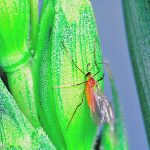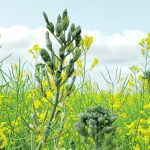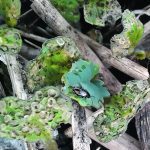Aster yellows might be rare, but it can be expensive. The last big outbreak cost Prairie canola growers $400 million in yield losses, Trevor Wist of AAFC told Manitoba Ag Days 2025.
Tag Archives Tyler Wist

Aster yellows rare but potentially costly Manitoba Ag Days speaker says
The last big outbreak is said to have cost Prairie canola growers $400 million in yield losses

‘Midgebusters’ seek resistant genes
Scientists explore wheat midge resistance in order to stack them into new varieties and extending the life of Sm1
Glacier FarmMedia – A new public-academic research project is scrutinizing an older spring wheat variety to assess its potential for midge tolerance. Researchers with Agriculture and Agri-Food Canada and the University of Manitoba are genomically mapping the 2013-released AC Vesper VB spring wheat to understand a trait that appears to repel female midge from laying […] Read more
Seeding dates can be tricky
WINNIPEG — The science around canola and seeding dates can be confusing. Plant early in May to maximize yield or seed later to avoid flea beetles, frost and re-seeding costs? “(There’s) always lots of questions (about seeding date),” said Chris Holzapfel, research manager with the Indian Head Agricultural Research Foundation. “It can be a difficult […] Read more

Study determines night spraying can benefit pollinators
Spraying for the lesser clover leaf weevil is not only easier on pollinators but also provides more effective pest control
Forage and seed producers heard about the benefits of night spraying for red clover crops during the Saskatchewan Forage Seed Development Commission’s recent annual meeting. The commission conducted two on-farm experiments of night spraying in June 2021. Graham Parsons, pollinator biosecurity specialist with the Saskatchewan agriculture department, identified the pollinators that benefit from nighttime pesticide […] Read more
A bad year for aster yellows?
It's too early to predict what will happen, but testing done in Saskatchewan indicates that a relatively high percentage of aster leafhoppers are carrying the disease this year.

Consider moisture before spraying flea beetle
“Canola can take a lot of damage before you actually need to spray. The conditions that make me worried for flea beetles though, are the hot and dry conditions because that makes the flea beetle bites on the plants worse. When it’s hot and dry, the plant can’t compensate for having these holes in it and then the holes lead to increased drying,” said Tyler Wist, an Agriculture Canada research scientist who studies flea beetles.



